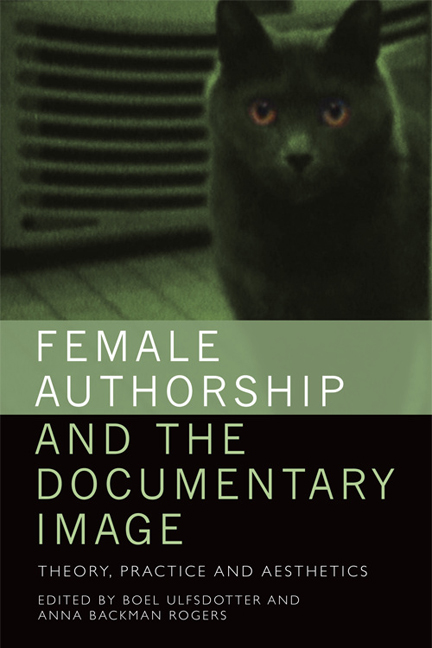Book contents
- Frontmatter
- Contents
- List of Illustrations
- Notes on the Contributors
- Foreword
- Introduction
- PART ONE DOCUMENTARY PRACTICES
- PART TWO DOCUMENTARY THEORIES
- PART THREE FEMALE AUTHORSHIP AND GLOBAL IDENTITIES
- ‘Being a Woman Documentary Maker in Taiwan’ – An interview with Singing Chen and Wuna Wu
- Select Bibliography
- Index
8 - The Memories of Belleville Baby: Autofiction as Evidence
Published online by Cambridge University Press: 05 May 2021
- Frontmatter
- Contents
- List of Illustrations
- Notes on the Contributors
- Foreword
- Introduction
- PART ONE DOCUMENTARY PRACTICES
- PART TWO DOCUMENTARY THEORIES
- PART THREE FEMALE AUTHORSHIP AND GLOBAL IDENTITIES
- ‘Being a Woman Documentary Maker in Taiwan’ – An interview with Singing Chen and Wuna Wu
- Select Bibliography
- Index
Summary
Given the expanded actuality of the documentary image on film and via new media platforms since the 1990s, first person accounts are now considered a household item on a par with its earlier forerunners in the North American avant-garde and European art film. The unwavering establishment of film forms such as the essay film, the video diary, the personal web page, advocating unorthodoxy regarding central documentary notions such as narrative structures, technical formats and subject matter, has permanently derailed the documentary format's longstanding tradition of objectivity, as well as a journalistic dissemination of information, as dictated by direct cinema. This changed attitude towards authorship is especially pertinent in relation to Swedish documentary film production because of its longstanding and intimate dependency on Swedish public service television as its major producer and distributor. This ideological change has led to the emergence of Swedish private production and distribution companies in this area, among which Story AB (Story Ltd) is the most prolific and successful. Story AB also lists the largest group of female directors among its collaborators and this chapter focuses on the remits of female authorship and the documentary image as represented in Mia Engberg's essay film Belleville Baby (dir. Mia Engberg, Sweden, 2013).
Formally trained at Les Ateliers Varan in Paris in the early 1990s, Engberg's first film in the tradition of cinéma-vérité was Les Enfants du Square (dir. Mia Engberg, France, 1994). Made while she was still a film student, the film reflects all the characteristics of the observational mode of documentary filmmaking she had just learned, such as long, unedited takes accompanied by the original soundtrack instead of a traditional voice-over guiding the spectator to the goings on around the square in the Parisian suburb of Belleville where she lived. The next pivotal step on her way towards a cinema in the first person, as well as the conceptualisation of Belleville Baby, were The Dirty Diaries: 12 Shorts of Feminist Porn (dir. Mia Engberg, Sweden, 2009), in which a number of Swedish directors had been asked to make a film on the subject of female pleasure. These shorts clearly fit within the formal paradigm of the essay film in that they are both strongly individual and metalinguistic, from the point of view that the structure of the whole series allows twelve authorial voices to come to the fore.
- Type
- Chapter
- Information
- Female Authorship and the Documentary ImageTheory, Practice and Aesthetics, pp. 144 - 158Publisher: Edinburgh University PressPrint publication year: 2018



